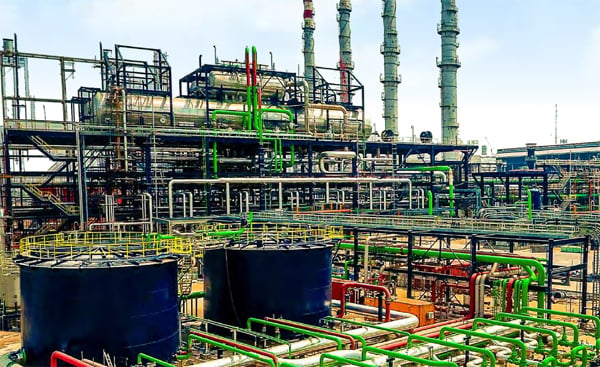In a landmark moment for Nigeria’s petroleum sector, Dangote Refinery has just exported its first cargo of gasoline to Asia.
According to industry reports, the 90,000-tonne shipment marks the refinery’s debut gasoline export and represents a triumph for Nigeria, which has long struggled with the paradox of being Africa’s largest producer of crude oil while depending heavily on imported fuel due to its inadequate domestic refining capacity.
Located in Lagos, the Dangote Refinery is the world’s largest single-train refinery, with a capacity to refine 650,000 barrels per day. Commissioned in 2023, the facility was designed to slash Nigeria’s reliance on imported petroleum products.
Although initial delays in local distribution and internal logistics slowed domestic supply, the export of gasoline to the international market suggests that the plant has attained another level of operating readiness and stability.
More than a commercial triumph, this export also carries tremendous economic implications for Nigeria.
One, it will relieve pressure on the nation’s foreign exchange reserves. Nigeria has spent billions of dollars annually on importing petrol, which has stretched the naira and triggered inflation. That with refined products being exported, foreign exchange can actually be earned through value addition on crude oil as opposed to selling the raw material at fluctuating global prices.
Second, it can stabilise local fuel prices in the long term. By local production and domestic sale of refined products, Nigeria will be better able to control supply chains, reduce disruption caused by imports, and pass cost savings on to consumers.
The federal government has already indicated that it will devise new regulatory policies that will allow Dangote’s production to be distributed domestically, which will improve the supply and affordability of fuel across the nation.
Yet the real significance of this milestone lies in what it solves. For decades, Nigeria’s government-owned refineries–located in Port Harcourt, Warri, and Kaduna–have been in a state of terminal decay despite billions spent on maintenance.
The privately funded and owned Dangote Refinery is a new model of infrastructure development, an operating, profit-making energy solution that can meet both the domestic and international markets.
The impact of this refinery is tremendous. Apart from oil, its operations are driving job creation and industrial growth. Already, transport companies, tanker companies, port facilities, and security outfits are benefiting from its operations. Nigerian technicians and engineers are being employed and trained, and local content in the value chain of petroleum is growing.
Furthermore, with consistent export capacity, Nigeria is now able to supply more to the regional and global refined product market, including landlocked neighbouring nations like Niger, Chad, and Mali that rely on Nigerian ports and trade routes.
But experts warn that realising the benefit of this export boom will require deliberate policy coordination. Domestic refineries must be supported, where petrol pricing is prioritised and fuel subsidy is discussed openly. There are calls from lawmakers, economists and civil society organisations for inclusive regulation that prevents market concentration and enables open access for independent fuel marketers.
Still, the success of the first gasoline export underscores the power of private enterprise combined with national urgency. The Dangote Refinery has cracked a puzzle where government systems have failed, demonstrating that Africa can refine its own crude, meet domestic demands, and become a serious player in the global energy market.
With sound regulation and inclusive economic policies, this refinery could yet be a launchpad for Nigeria’s long-term energy self-sufficiency and economic renaissance.
Dangote Refinery in Nigeria has achieved a significant milestone by exporting its first cargo of gasoline, a 90,000-tonne shipment, to Asia. This event is a major success for Nigeria, a country that has historically struggled with dependence on fuel imports despite being Africa's largest crude oil producer. Located in Lagos, the world's largest single-train refinery with a 650,000 barrels per day capacity is expected to reduce Nigeria's reliance on imported petroleum products, marking a significant shift towards energy self-sufficiency.
The economic ramifications are extensive, as this export can help stabilize the naira by relieving pressure on foreign exchange reserves, potentially stabilizing local fuel prices due to increased local production. The federal government plans to support domestic distribution, increasing the supply and affordability of fuel. Unlike previous government-owned refineries, the privately funded Dangote Refinery is proving to be an effective and profitable infrastructure model that stimulates job creation, industrial growth, and a growing local content in petroleum's value chain.
However, policy coordination is necessary to fully realize the refinery's benefits, emphasizing domestic refineries' support, transparent fuel pricing, and inclusive regulations to prevent market concentration. With strategic policies in place, the Dangote Refinery's success could drive Nigeria's energy self-sufficiency and economic renaissance, breaking away from where government initiatives have faltered and positioning Nigeria as a competitive player in the global energy market.






